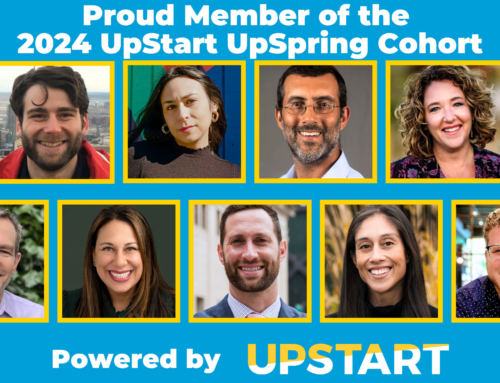There has been much discussion about the importance of connectivity and dialogue in the Jewish community, and the value of the network as a model to enable that. In The Jewish Week, Gary Rosenblatt laments the lack of conversation between Orthodox Jews and Jews of other denominations: There are discussion groups between Jews and Christians, and Jews and Muslims; how about a few more between Orthodox Jews and the rest of the community? In another recent piece, Chip Edelsberg of the Jim Joseph Foundation points to the profound shift from bureaucracy and organizational hierarchy grounded in analog-based communication to a networked universe powered by digital technology and admits that the funding and education communities still function according to the old model. And Annie Lumerman, a recent participant in the Schusterman Foundations NetWORKS gathering, lauds the open-ended network as a model that leads to sparks of connectivity and an open environment for conversations across the aisle to break down barriers and find common ground between different communities. These are calls to action, and we sound them loud and clear. But then we go to work, and, by and large, function the way we always have.
When considering the power and potential of a network model, and its horizontal structure that gives equal weight to multiple perspectives, there are two hidden, conflicting perspectives regarding human nature at play. I think it is important to explore them, for perhaps that will better allow us to consider what it is we value and strive for when we fill these virtual pages with a desire for better connections and conversations, and what it is we are so afraid of that is preventing us from actually changing the way we operate.
The first approach, reflective of the patterns in the world until very recently, is that most people are unskilled, unintelligent, and undisciplined. They are, as George Packer writes in the November 28th edition of The New Yorker, the mindless herd, in stark contrast to the entrepreneur, in an article explaining the attitude of Silicon Valley mogul Peter Thiel. There are two assumptions here one, that most people are not too bright and therefore follow each other blindly and dont initiate progress, and two, that it is not enough to be smart you also need to be trained. All animals are equal, but some are more equal than others, and those that are more equal get opportunities that the others do not. The American dream depends upon this approach. Those with a yiddishe kopf, a bit of mazel, and a lot of grit can rise to the top. And, once they do, they must be rewarded with ultimate decision-making power. This small group of highly trained, highly educated, highly motivated, highly passionate, and intelligent people have ideas and opinions, and they must be given greater weight than those of others. They have worked very hard to get a seat at the table. Dont let it get crowded with the riffraff.
The second approach, which has largely emerged in the internet age, is that all people have something valuable to offer, multiple intelligences, perspectives, life experiences, and opinions, that can tremendously enrich the common good. This perspective has been recently framed by Clay Shirky as cognitive surplus, and assumes that most human beings are generous, intelligent, and capable; they like to create, theyre good at it, and they like to share. It assumes that there are lots and lots of incredibly smart people out there (and most of them dont work for you). Many in Silicon Valley and the innovation sector embrace this approach. The business model of the X Prize Foundation depends upon it. Their role as foundation is to come up with a concrete, specific problem, and frame it as a challenge. They then offer a tantalizing cash prize to any individual or group that can solve it. At the time of the BP oil spill, they put out a prize challenging people to clean oil off of water more quickly than the current technology allows. One team of finalists was a group of guys from Las Vegas that had no prior experience or expertise in the subject, who tinkered with ideas at a bar, and tested their idea for the first time at the actual competition; their technology worked three times as well as the current one. Now, thats an impressive mindless herd.
Bob Kegan and Lisa Lahey introduced the concept of immunity to change. They argue that when people, or organizations, express a desire for change but find themselves reverting, time and time again, to old patterns, there are actually conflicting values at play. There is a set of values behind their patterned behavior, and a set of values behind the desired new behavior, and the old values always trump the new. Perhaps the Jewish community is stuck in such a bind. On the one hand, those who are sitting in seats of power have worked exceptionally hard to get there, and they, and we who have placed them there, need to believe that they are there for a reason, and that they have an intelligence and expertise that others do not have, and, therefore, the authority and responsibility to make decisions and changes. On the other, we also genuinely value, and want to value, the second approach, that gives authority to everyone, that stipulates that a teens experience is invaluable to the head of a major foundation, and that someone who has never studied Torah can ask a question that gives the Rabbis pause.
Kegan and Lahey point out that often, when we are having difficulty making the changes we claim to want to make, we are held hostage by fear. Perhaps we as a community are afraid that if we truly embrace a model that is collaborative, open source, and networked, and give authority to the unlearned and inexperienced, we will lose all sense of structure, there will be no boundaries, no benchmarks, and chaos will reign. We will lose our jobs, our seats at the table, and the multitudes will swarm in, ultimately devaluing all that we have held dear and sacred. This is the point at which Kegan and Lahey challenge us to test that assumption. Is there some small way we can move a step closer to a structure that assumes the more generous approach to human nature that does not annihilate the values behind the first approach? Is there a way to re-explore the processes of decision-making and positions of authority, to better utilize the cognitive surplus that surrounds us?
The work of the professionals is critically important. But perhaps their job descriptions are shifting. In todays world, we may need more expertise in clearly defining the problems, and less in providing solutions. Maybe we should begin to test the various ways in which we can empower and engage the networked masses to take responsibility, to rise to the occasion.
Maya Bernstein is an associate at UpStart Bay Area. This piece was cross-posted on e-jewishphilanthropy.com.
Our purpose is to enable entrepreneurs to bring bold Jewish ideas to light. We help them reach Up to people in new ways that are meaningful, more inclusive, and create a brighter future for our Jewish community and the world we share.




